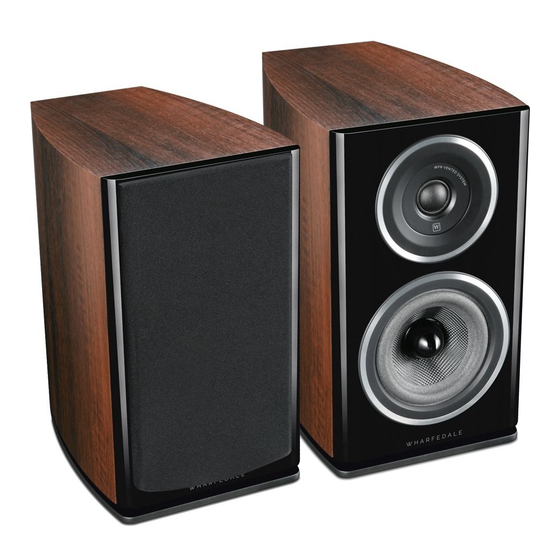
Summary of Contents for Wharfedale Pro Diamond 11.0
- Page 20 Diamond 11 Series Diamond11.0 Diamond11.1 Diamond11.2 Diamond11.3 Diamond11.4 Diamond11.5 Diamond11.CC Diamond11.CS Diamond11.CM Diamond11.SR Diamond11.DFS...
-
Page 21: Important Safety Information
Important Safety Information Before installing this product read all these instructions! This symbol indicates that there are important operating and maintenance instructions in the literature accompanying this unit. Read these instructions. Keep these instructions. Heed all warnings. Follow all instructions. Before making any connections, switch all the units in your system o at the mains. - Page 22 The bookshelf loudspeakers are intended primarily for stand mounting, though they can be mounted on wall brackets or even on sturdy shelv Each centre channel loudspeaker is supplied with one set of mounting feet. By using combination of large and small feet the loudspeaker may be angled to point directly at the listening position.
-
Page 23: Positioning The Front Loudspeakers
Positioning the Front Loudspeakers The 11.3, 11.4 and 11.5 models are designed to be oor standing. We suggest that they are positioned at least 200mm from the rear walls and 700mm from the side walls, facing slightly inwards. The 11.0 and 11.1 11.2models should be stand or wall mounted though they may be placed on a rigid shelf. -
Page 24: Connecting The Front Loudspeakers
Connecting the Front Loudspeakers Standard Connection Choose a suitable length of twin core speaker cable for each channel, and prepare the ends. Unscrew each terminal a few turns. Connect the red, positive (+) terminal of the Left loudspeaker to the corresponding red, positive (+) amplifier terminal. Connect the black, negative (-) terminals similarly. -
Page 25: Setting Up A Home Theatre System
Connecting Centre Loudspeaker The Centre channel speaker may be connected as shown, or bi-wired. Setting Up a Home Theatre System Placement Front and E ects Channels: The front loudspeakers are placed on either side of the television screen, 2 to 3 metres apart. The speakers should be angled slightly so they car aimed towards the listeners. -
Page 26: Troubleshooting
Setting Loudspeaker Sizes and Levels If you are not using a subwoofer: Set the Front speakers to ‘Large’. Set the ‘Subwoofer’ option on the processor to ‘Off’ or ‘No’. The Front channels will now receive all the system bass. If you are using a subwoofer: When set to ‘Small’ all the system bass will go into the subwoofer. If you choose ‘Large’ the Front channel bass will be reproduced from the Front speakers. - Page 27 Looking After Your Loudspeaker Your loudspeakers use special hardwearing sealed nish. They should not be waxed or treated with spray polishes which will smear and dim the nish. Occasionally polish them with a dry or barely moist cloth to remove dust and nger marks, etc. If you play the speakers with the grilles o exercise great care.
-
Page 28: Specifications
Specifications Model Diamond 11.0 Diamond 11.1 Diamond 11.2 General description 2-way bookshelf speaker 2-way bookshelf speaker 2-way bookshelf speaker Design philosophy and core technology Enclosure type bass re ex bass re ex bass re ex Transducer complement 2-way 2-way 2-way Bass driver 4"(100mm) Woven Kevlar Cone... - Page 29 Diamond 11.CM Model Diamond 11.CC Diamond 11.CS 2-way centre speaker General description 2-way centre speaker 2-way centre speaker Design philosophy and core technology Enclosure type closed-box system Transducer complement 2-way 2-way 2-way 5"(130mm) Woven Kevlar Cone x 4 Bass driver 4"(100mm) Woven Kevlar Cone X2 5"(130mm) Woven Kevlar Cone x 2 Midrange driver...
- Page 30 IAG House, 13/14 Glebe Road, Huntingdon, Cambridgeshire, PE29 7DL, UK Tel: +44(0)1480 452561 Fax: +44(0)1480 413403 http://www.wharfedale.co.uk IAG reserves the right to alter the design and speci cations without notice. All rights reserved IAG Group Ltd. Wharfedale is a member of the International Audio Group. CODE: WH14-MNL005a...















Need help?
Do you have a question about the Diamond 11.0 and is the answer not in the manual?
Questions and answers